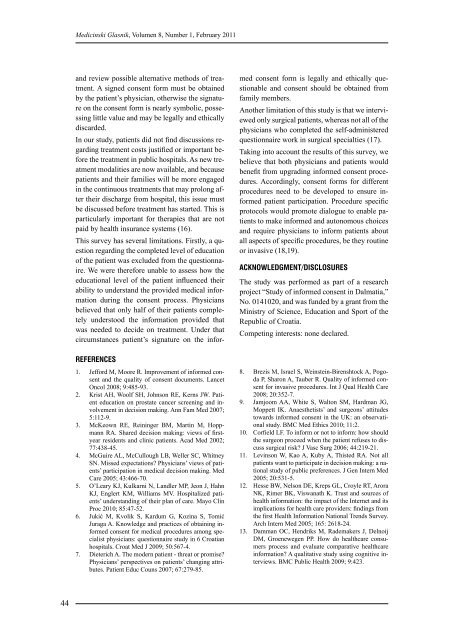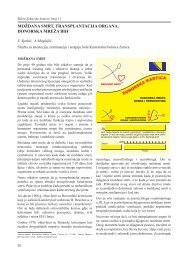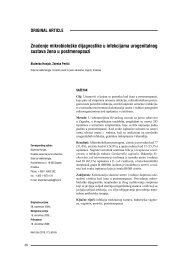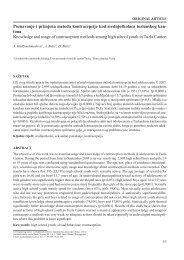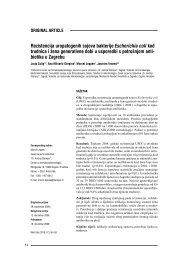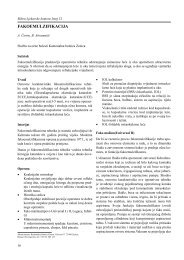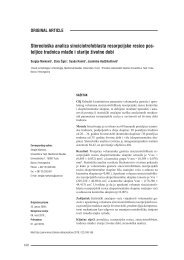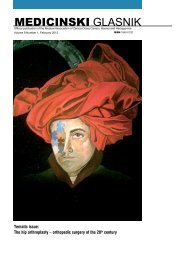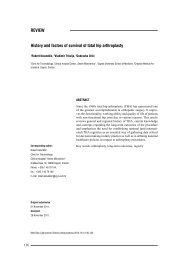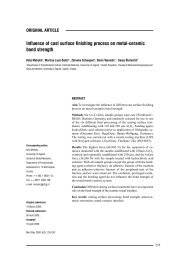MEDICINSKI GLASNIK - Aktuelno Ljekarska komora ZE - DO kantona
MEDICINSKI GLASNIK - Aktuelno Ljekarska komora ZE - DO kantona
MEDICINSKI GLASNIK - Aktuelno Ljekarska komora ZE - DO kantona
Create successful ePaper yourself
Turn your PDF publications into a flip-book with our unique Google optimized e-Paper software.
44<br />
Medicinski Glasnik, Volumen 8, Number 1, February 2011<br />
and review possible alternative methods of treatment.<br />
A signed consent form must be obtained<br />
by the patient’s physician, otherwise the signature<br />
on the consent form is nearly symbolic, possessing<br />
little value and may be legally and ethically<br />
discarded.<br />
In our study, patients did not find discussions regarding<br />
treatment costs justified or important before<br />
the treatment in public hospitals. As new treatment<br />
modalities are now available, and because<br />
patients and their families will be more engaged<br />
in the continuous treatments that may prolong after<br />
their discharge from hospital, this issue must<br />
be discussed before treatment has started. This is<br />
particularly important for therapies that are not<br />
paid by health insurance systems (16).<br />
This survey has several limitations. Firstly, a question<br />
regarding the completed level of education<br />
of the patient was excluded from the questionnaire.<br />
We were therefore unable to assess how the<br />
educational level of the patient influenced their<br />
ability to understand the provided medical information<br />
during the consent process. Physicians<br />
believed that only half of their patients completely<br />
understood the information provided that<br />
was needed to decide on treatment. Under that<br />
circumstances patient’s signature on the infor-<br />
REFERENCES<br />
1. Jefford M, Moore R. Improvement of informed consent<br />
and the quality of consent documents. Lancet<br />
Oncol 2008; 9:485-93.<br />
2. Krist AH, Woolf SH, Johnson RE, Kerns JW. Patient<br />
education on prostate cancer screening and involvement<br />
in decision making. Ann Fam Med 2007;<br />
5:112-9.<br />
3. McKeown RE, Reininger BM, Martin M, Hoppmann<br />
RA. Shared decision making: views of firstyear<br />
residents and clinic patients. Acad Med 2002;<br />
77:438-45.<br />
4. McGuire AL, McCullough LB, Weller SC, Whitney<br />
SN. Missed expectations? Physicians’ views of patients’<br />
participation in medical decision making. Med<br />
Care 2005; 43:466-70.<br />
5. O’Leary KJ, Kulkarni N, Landler MP, Jeon J, Hahn<br />
KJ, Englert KM, Williams MV. Hospitalized patients’<br />
understanding of their plan of care. Mayo Clin<br />
Proc 2010; 85:47-52.<br />
6. Jukić M, Kvolik S, Kardum G, Kozina S, Tomić<br />
Juraga A. Knowledge and practices of obtaining informed<br />
consent for medical procedures among specialist<br />
physicians: questionnaire study in 6 Croatian<br />
hospitals. Croat Med J 2009; 50:567-4.<br />
7. Dieterich A. The modern patient - threat or promise?<br />
Physicians’ perspectives on patients’ changing attributes.<br />
Patient Educ Couns 2007; 67:279-85.<br />
med consent form is legally and ethically questionable<br />
and consent should be obtained from<br />
family members.<br />
Another limitation of this study is that we interviewed<br />
only surgical patients, whereas not all of the<br />
physicians who completed the self-administered<br />
questionnaire work in surgical specialties (17).<br />
Taking into account the results of this survey, we<br />
believe that both physicians and patients would<br />
benefit from upgrading informed consent procedures.<br />
Accordingly, consent forms for different<br />
procedures need to be developed to ensure informed<br />
patient participation. Procedure specific<br />
protocols would promote dialogue to enable patients<br />
to make informed and autonomous choices<br />
and require physicians to inform patients about<br />
all aspects of specific procedures, be they routine<br />
or invasive (18,19).<br />
ACKNOWLEDGMENT/DISCLOSURES<br />
The study was performed as part of a research<br />
project “Study of informed consent in Dalmatia,”<br />
No. 0141020, and was funded by a grant from the<br />
Ministry of Science, Education and Sport of the<br />
Republic of Croatia.<br />
Competing interests: none declared.<br />
8. Brezis M, Israel S, Weinstein-Birenshtock A, Pogoda<br />
P, Sharon A, Tauber R. Quality of informed consent<br />
for invasive procedures. Int J Qual Health Care<br />
2008; 20:352-7.<br />
9. Jamjoom AA, White S, Walton SM, Hardman JG,<br />
Moppett IK. Anaesthetists’ and surgeons’ attitudes<br />
towards informed consent in the UK: an observational<br />
study. BMC Med Ethics 2010; 11:2.<br />
10. Corfield LF. To inform or not to inform: how should<br />
the surgeon proceed when the patient refuses to discuss<br />
surgical risk? J Vasc Surg 2006; 44:219-21.<br />
11. Levinson W, Kao A, Kuby A, Thisted RA. Not all<br />
patients want to participate in decision making: a national<br />
study of public preferences. J Gen Intern Med<br />
2005; 20:531-5.<br />
12. Hesse BW, Nelson DE, Kreps GL, Croyle RT, Arora<br />
NK, Rimer BK, Viswanath K. Trust and sources of<br />
health information: the impact of the Internet and its<br />
implications for health care providers: findings from<br />
the first Health Information National Trends Survey.<br />
Arch Intern Med 2005; 165: 2618-24.<br />
13. Damman OC, Hendriks M, Rademakers J, Delnoij<br />
DM, Groenewegen PP. How do healthcare consumers<br />
process and evaluate comparative healthcare<br />
information? A qualitative study using cognitive interviews.<br />
BMC Public Health 2009; 9:423.


